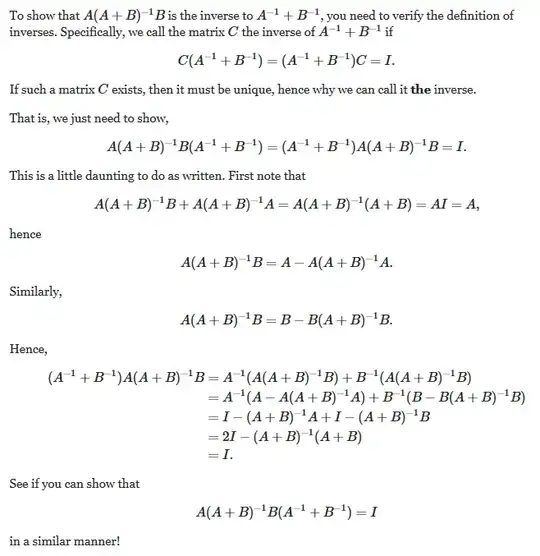I have the following issue: $A,B\in\mathbb C^{n\times n}$ invertible, such that also $A + B$ is invertible. How is it shown that $A^{-1} + B^{-1}$ is invertible?
Asked
Active
Viewed 3,268 times
4
-
See the introduction to posting mathematical notation. – hardmath Mar 27 '19 at 15:52
-
Can we fix the title ? – T. Fo Mar 27 '19 at 19:57
-
@Andreu Gooz Biel: If your question has been answered below, please, accept an answer. Otherwise your question remains open indefinitely. Thank you! – Moritz Apr 01 '19 at 20:59
-
https://math.stackexchange.com/q/1505628/321264 – StubbornAtom Jan 28 '22 at 13:35
3 Answers
8
$$ A^{-1}+B^{-1} = A^{-1}(A+B)B^{-1} $$ By the way: (Spanish) demonstración --> (English) proof. ;-)
amsmath
- 10,633
1
Of course you know that a square matrix has a two sided inverse if you have found an inverse from one side.
Moritz
- 1,992
1
Here is a more pedantic approach to @amsmath's slick approach:
Suppose we want to solve $(A^{-1} + B^{-1}) x = A^{-1}x + B^{-1} x = y$.
Then $Ay=x + AB^{-1} x $, and letting $x'=B^{-1} x$ we get $Ay = B x' + A x' = (A+B)x'$ and so $x'= (A+B)^{-1} Ay$ and finally $x=Bx' = B(A+B)^{-1} Ay$.
Hence $(A^{-1} + B^{-1})^{-1} = B(A+B)^{-1} A$.
copper.hat
- 172,524
